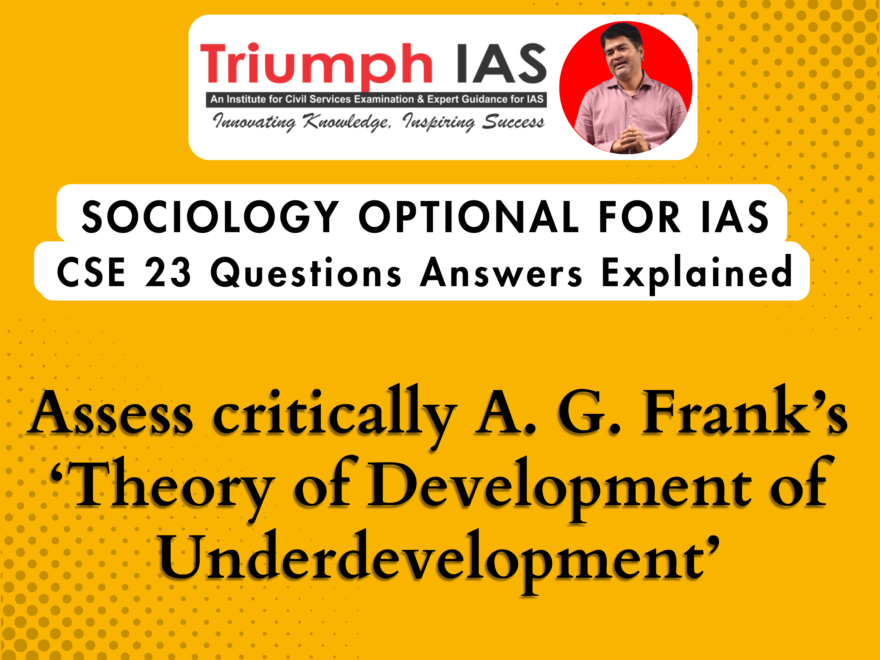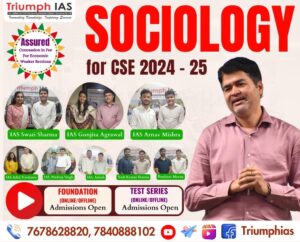Assess critically A. G. Frank’s ‘Theory of Development of Underdevelopment’
Section: B.
Sociology Paper 2023 Analysis.
Relevant for Paper-1 : Unit 10 : social changes in modern society
Question- 7 (C): Assess critically A. G. Frank’s ‘Theory of Development of Underdevelopment’ (10 Marks)
|
Introduction: Briefly give background of A . G. FRANK. Main Body: Key points of A.G. Frank’s theory of development of underdevelopment, Critique of the theory. Conclusion: Relevance of theory. |
Introduction
The “dependency theory” or “theory of development of underdevelopment” associated with Andre Gunder Frank is an approach to understanding the economic development (or lack thereof) of nations. Frank was a heterodox economist and sociologist who argued that the global economic system is characterized by a center-periphery structure, where a small group of developed countries (the center) exploits and dominates a larger group of underdeveloped countries (the periphery).
Main Body
Key points of A.G. Frank’s theory of development of underdevelopment:
- Historical Development: Frank emphasized historical processes and argued that underdevelopment is not a stage that countries go through on their way to development, but rather a result of historical processes of exploitation and unequal exchange.
- Center-Periphery Structure: The core concept in Frank’s theory is the idea of a center-periphery structure. The center refers to the developed countries, while the periphery refers to the underdeveloped countries. The relationship between the center and the periphery is characterized by exploitation and dependency.
- Unequal Exchange: Frank argued that the international trade system is inherently exploitative, leading to the transfer of resources from the periphery to the center. He believed that the terms of trade are biased against the periphery, resulting in a net flow of wealth from less developed to more developed countries.
- Capitalist World System: Frank viewed the global economy as a capitalist world system where the development of some countries is dependent on the underdevelopment of others. He rejected the idea that underdevelopment is a transitional phase and instead saw it as a structural aspect of the world system.
- Imperialism and Dependency: Frank drew on Marxist concepts of imperialism and argued that the development of the center is contingent on the underdevelopment and dependency of the periphery. The center exploits the periphery not only through economic means but also through political and social mechanisms.
- Critique of Modernization Theory: Frank’s theory was a critique of the prevailing modernization theory, which suggested that underdeveloped countries could achieve development by following the path of the developed nations. Frank argued that this perspective ignored the historical and structural factors that perpetuated underdevelopment.
Critique of the Theory
- Frank’s theory has been criticized on the ground that the theory is overly deterministic and simplistic. It tends to paint a picture of a world neatly divided into exploitative rich countries and exploited poor countries, ignoring the complexities and nuances of global economic relationships.
- Liberals argue that the core needs the periphery to grow and industrialize as a source of new investment and new market.
- Samir Amin in his work titled, Unequal Development: An Essay on the Social Formations of Peripheral Capitalism (1976), observes that historical analysis of radical dependency theory represented by Frank is too generalized.
- Frank’s theory fails to show unevenness of the development of the peripheral states, ranging from the backwardness of Ethiopia to the growing industries of Asian Tigers – a point also made by Cardoso.
- The theory has been criticised for its lack of empirical support. Many countries that were once considered peripheral, such as South Korea, Taiwan, and Singapore, have successfully developed their economies without severing ties with the core countries.
- The theory underestimates the role of internal factors in underdevelopment. It largely ignores the impact of domestic policies, corruption, political instability, and cultural factors on the economic performance of underdeveloped countries.
- Lastly, the theory has been criticised for its pessimistic view of the prospects for underdeveloped countries. It suggests that these countries are trapped in a cycle of underdevelopment with no clear path to development.
Conclusion
It’s important to note that while Frank’s ideas were influential, there has been ongoing debate and criticism of dependency theory. Some critics argue that it oversimplifies the complexities of global economic relations and that it doesn’t adequately address internal factors within countries that contribute to underdevelopment. Despite criticisms, dependency theory has played a significant role in shaping discussions about global inequality and development.
Related Blogs…
To master these intricacies and fare well in the Sociology Optional Syllabus, aspiring sociologists might benefit from guidance by the Best Sociology Optional Teacher and participation in the Best Sociology Optional Coaching. These avenues provide comprehensive assistance, ensuring a solid understanding of sociology’s diverse methodologies and techniques.
META TAGS:
Iron Law of Oligarchy, Robert Michels, Vilfredo Pareto, Lions and Foxes theory, power dynamics, organizational oligarchy, elite circulation, political sociology, leadership styles, organizational control, sociological theories, political maneuvering, elite differentiation, power concentration, societal stability, political leadership, strategic political leadership, Sociology Question Paper, Sociology Question Paper 2023, Sociology Question Paper CYQ, Sociology Question Paper UPSC, What, according to Robert Michels, is the iron law of oligarchy? Do lions and foxes in Vilfredo Pareto’s theory, essentially differ from each other? Substantiate.
Why Vikash Ranjan’s Classes for Sociology?
Proper guidance and assistance are required to learn the skill of interlinking current happenings with the conventional topics. VIKASH RANJAN SIR at TRIUMPH IAS guides students according to the Recent Trends of UPSC, making him the Best Sociology Teacher for Sociology Optional UPSC.
At Triumph IAS, the Best Sociology Optional Coaching platform, we not only provide the best study material and applied classes for Sociology for IAS but also conduct regular assignments and class tests to assess candidates’ writing skills and understanding of the subject.
Choose The Best Sociology Optional Teacher for IAS Preparation?
At the beginning of the journey for Civil Services Examination preparation, many students face a pivotal decision – selecting their optional subject. Questions such as “which optional subject is the best?” and “which optional subject is the most scoring?” frequently come to mind. Choosing the right optional subject, like choosing the best sociology optional teacher, is a subjective yet vital step that requires a thoughtful decision based on facts. A misstep in this crucial decision can indeed prove disastrous.
Ever since the exam pattern was revamped in 2013, the UPSC has eliminated the need for a second optional subject. Now, candidates have to choose only one optional subject for the UPSC Mains, which has two papers of 250 marks each. One of the compelling choices for many has been the sociology optional. However, it’s strongly advised to decide on your optional subject for mains well ahead of time to get sufficient time to complete the syllabus. After all, most students score similarly in General Studies Papers; it’s the score in the optional subject & essay that contributes significantly to the final selection.
“A sound strategy does not rely solely on the popular
Opinion of toppers or famous YouTubers cum teachers.”
It requires understanding one’s ability, interest, and the relevance of the subject, not just for the exam but also for life in general. Hence, when selecting the best sociology teacher, one must consider the usefulness of sociology optional coaching in General Studies, Essay, and Personality Test.
The choice of the optional subject should be based on objective criteria, such as the nature, scope, and size of the syllabus, uniformity and stability in the question pattern, relevance of the syllabic content in daily life in society, and the availability of study material and guidance. For example, choosing the best sociology optional coaching can ensure access to top-quality study materials and experienced teachers. Always remember, the approach of the UPSC optional subject differs from your academic studies of subjects. Therefore, before settling for sociology optional, you need to analyze the syllabus, previous years’ pattern, subject requirements (be it ideal, visionary, numerical, conceptual theoretical), and your comfort level with the subject.
This decision marks a critical point in your UPSC – CSE journey, potentially determining your success in a career in IAS/Civil Services. Therefore, it’s crucial to choose wisely, whether it’s the optional subject or the best sociology optional teacher. Always base your decision on accurate facts, and never let your emotional biases guide your choices. After all, the search for the best sociology optional coaching is about finding the perfect fit for your unique academic needs and aspirations.
Follow us :
🔎 https://www.instagram.com/triumphias
🔎 https://www.youtube.com/c/TriumphIAS
🔎 https://t.me/VikashRanjanSociology
Find More Blogs…
| Compare and contrast Karl Marx’s and Max weber’s | Karl Marx- Historical Materialism |
| Position of Women In the Modern Indian Society | Sociology: Social system and pattern variables |
KEYWORD: theory of development of underdevelopment,theory of development of underdevelopment,theory of development of underdevelopment,theory of development of underdevelopment,theory of development of underdevelopment,theory of development of underdevelopment,theory of development of underdevelopment,theory of development of underdevelopment,theory of development of underdevelopment,theory of development of underdevelopment,theory of development of underdevelopment,theory of development of underdevelopment,theory of development of underdevelopment,theory of development of underdevelopment


